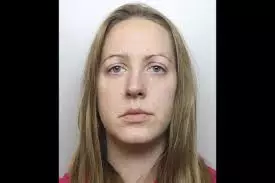OF CABBAGES AND KINGS | Is Nurse Guilty or Innocent? Cause Célèbre UK Justice Test | Farrukh Dhondy
The evidence that convicted her was mostly that of medical experts and some inferences from notes in her personal diary

“She had my heart and yet wanted my soul
--I must admit, this is a line I stole
From a poet who won the Nobel Prize
Because it expressed precisely the whole
Situation of our love going wrong
--though life is short, still love can prolong
The state of bliss, so can the poets sing
Verses that can be called Redemption Song?”
From The Rubaiyat of Bachchoo
Just as British justice demands that one is presumed innocent until, through the due process of law, proved guilty, so if that process convicts you of a crime, you are presumed guilty until proved innocent. That entails an appeal or retrial through the emergence of fresh evidence.
In one of the most publicised trials in the UK in recent history, a 34-year-old nurse called Lucy Letby was convicted in 2024 of the murder of seven infants and the attempted murder of seven more at the Countess of Chester Hospital where she worked.
Letby faced two trials at the Manchester Crown Court. The first one resulted in the jury not being able to agree on a verdict. The second one convicted her of seven murders of very young infants and sentenced her to 15 “whole-life” imprisonment. Was she the Herod of today’s UK?
The evidence that convicted her was mostly that of medical experts and some inferences from notes in her personal diary.
And yet, as an inquiry into conditions and lax practices in the infant’s department of the Countess of Chester Hospital has been initiated by the National Health Service, a concerted campaign in the national press has begun to treat Lucy Letby’s conviction as a serious miscarriage of justice.
The UK’s leading satirical and investigative magazine, Private Eye, dedicatedly publishes news of the campaign to prove Letby’s innocence.
The lawyer in charge of Letby’s defence, Mark McDonald, is presenting evidence to the Criminal Cases Review Commission (CCRC). Letby’s defence team has compiled a dossier of opinions and investigations into the deaths of the infants by a panel of international neonatologists and paediatric specialists who say their detailed and diligent analysis finds no evidence that Letby harmed any babies.
Mr McDonald will also deliver a separate report from seven medical experts claiming the results of insulin tests on two of the supposed infant victims, labelled Baby F and Baby L, whom a jury concluded Letby had poisoned, were unreliable.
Letby’s legal team are asking for her case to be referred to the Court of Appeal for a full hearing.
If and when the CCRC and the Court of Appeal consent to examining the Letby case, they will inevitably be faced with detailed medical considerations and perhaps contradictory neo-natal opinions from highly qualified doctors who have come forward, mostly to defend Letby and provide opinions that counter the allegations of her guilt. Both these institutions will have to rely on the interpretations of these medical experts.
Additionally, 14 medical experts, qualified in this field, will provide the CCRC and the Court of Appeal with evidence, which reads as follows:
“BABY 1: (Known as Child A in the trial): The prosecution said the boy was murdered by an injection of air into the bloodstream which caused an air embolism where bubbles form and block the blood supply. The panel found no evidence of air embolism and said the child had died from thrombosis, where a blood clot forms in a vessel.”
The panel’s report considers the seventeen accusations of murder against Letby in the same vein and comes to the same conclusion. She didn’t do what the prosecution alleged.
However, last week a sensational piece of news emerged which may overshadow all the medical evidence. The newspapers, at first the Mail on Sunday, published an email sent on May 4, 2017 by Dr Ravi Jayaram, a senior paediatrician at the Countess of Chester Hospital, to his colleagues.
The email plainly states that Lucy Letby had noticed indications of “low saturations” in one of the infants in her care. According to the email, Dr Jayaram said she summoned him immediately and he came to the baby who was in an incubator. The email also said Baby K’s fragile premature condition was the cause of her death: “Baby subsequently deteriorated and eventually died, but events around this would fit with explainable events associated with extreme prematurity.” Clear enough.
BUT! Dr Jayaram contradicted what he had written in this May 2017 email to his professional colleagues when he appeared as a prosecution witness in the murder case against Letby in 2024.
Appearing in both 2024 trials, Dr Jayaram said that Letby was at the side of Baby K’s incubator and was acting suspiciously. Asked by the prosecution lawyer whether he had “any call for help from Lucy Letby?”, he replied: “No. Not at all.”
The prosecution presented him as a key witness who had caught Letby “red-handed”. This email now proves that his evidence was a contradiction and a lie. Some of the reports hint at a friendship and a dating relationship between Dr Jayaram, who is married and has a son, and Letby.
Senior nurses at the hospital have said they believe Letby is innocent and attribute the damning testimony of some doctors to the fact that Letby had complained of them bullying the nursing staff.
Why Dr Jayaram set out to convict Letby is as yet unexplained.
